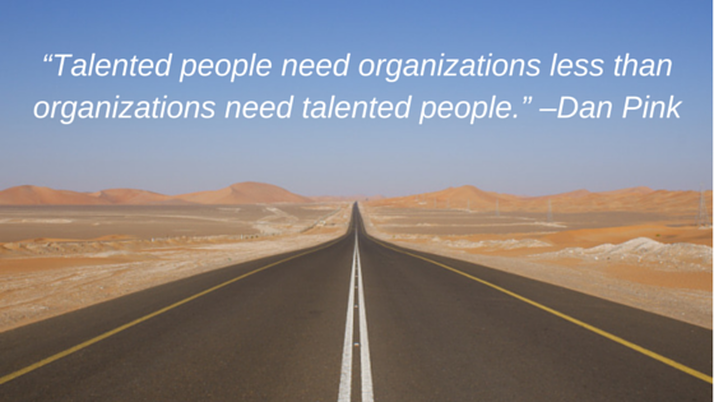These are exciting times for talent management. First, talent is finally getting the focus it deserves in the C-suite. Once treated as something for only HR departments to worry about, talent is now the number one concern of CEOs. Second, we are seeing dramatic shifts in the way companies are thinking about and approaching talent management. Employees’ priorities have changed, and talent management is changing as a result. Traditional approaches to talent management are quickly becoming obsolete, and companies that refuse to change with the times are going to find it increasingly difficult to hire and retain great people, as the economy continues to rebound and the balance of power continues to shift from employer to employee. In order to thrive, companies need to embrace a new model of talent management.
Employees' priorities have changed
The way people work has changed: how people work, when people work, where people work, and even why people work.
Employees' priorities have changed
The way people work has changed: how people work, when people work, where people work, and even why people work.
And it’s not just the way people work that has changed; what matters most to employees has changed significantly in recent years. A lot of research has been done on what employees want, including surveys by Ernst & Young (EY), the Society for Human Resource Management (SHRM), Quantum Workplace and Gallup. It’s not a one-size-fits-all model, but several clear themes have emerged:
How talent management is changing as a result
So, what do these changes mean for the future of talent management? In short, a lot. To continue to be successful at attracting and retaining great people, many companies will need to make a fundamental mindset shift in their approach to managing talent. Talent management needs to evolve to put people first and take its place at the center of a successful enterprise.
What does the future of talent management look like?
- Respect: Plain and simple, employees want to be treated with respect at work. Respect topped the list of SHRM’s survey, with 72% of employees ranking "respectful treatment of all employees at all levels" as the most important factor in job satisfaction. Hence, a word of caution to command-and-control organizations: the days of leaders who steamroll their teams to get things done are numbered.
- Flexibility: Employees’ desire for greater flexibility at work is the primary driver behind the changes in how, where and when employees work. According to an EY survey of 9,700 employees across eight countries, employees rated “being able to work flexibly and still be on track for promotion” and “working with colleagues, including my boss, who support my efforts to work flexibly” as very important in a job. And it’s not just about convenience; employees want to have the freedom to do their best work…however, wherever and whenever that may be.
- Purpose: All employees want to do meaningful work, but purpose – the belief and understanding that you’re part of a larger force for good – is especially important to Millennials. According to the Deloitte Millennial Survey 2015, a “sense of purpose” is given as a reason for choosing to work for their current employer by six out of ten Millennials. And what matters to Millennials, who now make up 45% of the workforce, needs to matter to employers.
- Relationships: With employees spending so much of their waking lives focused on their job, it makes sense that they place a high value on having good relationships with their colleagues. One of Gallup’s 12 indicators of employee engagement is having a best friend at work. And according to Officevibe, 70% of employees say friends at work is the most crucial element to a happy working life. Clearly, relationships at work matter.
- Growth opportunities: According to Quantum Workplace’s 2015 Employee Engagement Trends, professional growth and career development opportunities are one of the top drivers of employee engagement. Employees, especially high performing employees, want to have ample opportunities to continuously grow their capabilities.
How talent management is changing as a result
So, what do these changes mean for the future of talent management? In short, a lot. To continue to be successful at attracting and retaining great people, many companies will need to make a fundamental mindset shift in their approach to managing talent. Talent management needs to evolve to put people first and take its place at the center of a successful enterprise.
What does the future of talent management look like?
In future blog posts, I'll do a deeper dive into each of these attributes of talent management: what the future looks like, the benefits of taking this approach to talent management, examples of companies who are successfully demonstrating these attributes and what other companies can do to get there.
Why aren't more companies embracing the future of talent management?
Change is hard, and there will always be people who are resistant to change (and therefore organizations that are resistant to change), even when the benefits of change are clear. We will continue to see more and more companies embrace the future of talent management, but such a substantial change as this will take time. Luckily, there are already a handful of companies who are leading the charge, showing us that there’s a better way to manage talent and giving us good examples to follow. One such company is Google, and Laszlo Bock does a wonderful job of sharing Google's approach to talent management in his book Work Rules! (which I highly, highly recommend to anyone interested in this topic).
I would love to hear your thoughts on the future of talent management. What other attributes would you add to the list? What do you think is driving these changes? Do you know of companies who are already living the future?
Photo credit: Wikimedia
Why aren't more companies embracing the future of talent management?
Change is hard, and there will always be people who are resistant to change (and therefore organizations that are resistant to change), even when the benefits of change are clear. We will continue to see more and more companies embrace the future of talent management, but such a substantial change as this will take time. Luckily, there are already a handful of companies who are leading the charge, showing us that there’s a better way to manage talent and giving us good examples to follow. One such company is Google, and Laszlo Bock does a wonderful job of sharing Google's approach to talent management in his book Work Rules! (which I highly, highly recommend to anyone interested in this topic).
I would love to hear your thoughts on the future of talent management. What other attributes would you add to the list? What do you think is driving these changes? Do you know of companies who are already living the future?
Photo credit: Wikimedia




 RSS Feed
RSS Feed